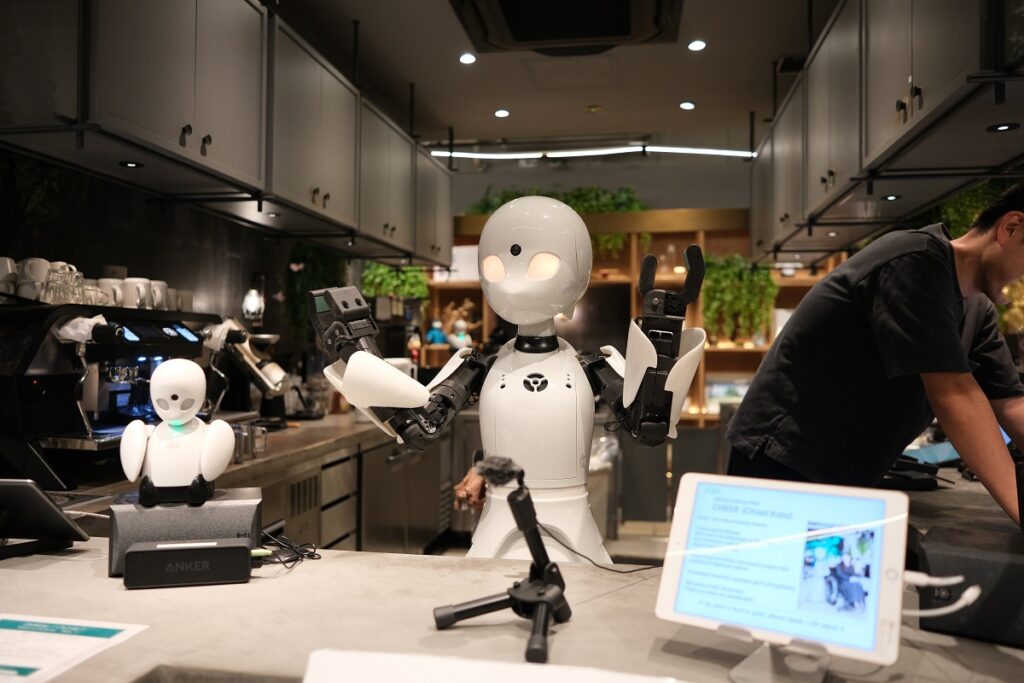When diners walked into a small café in Tokyo a few years ago, they were greeted not by waiters, but by robots. The machines took orders, brought drinks and chatted with customers. Yet they were not running on their own.
Each robot was remotely operated by a disabled person sitting at home, controlling the machine as an extension of themselves.
For Héctor González-Jiménez, co-director of the ESCP Tech Institute and professor of marketing, the café, known as Dawn Avatar, was a spark. “The robots were operated from a distance by disabled people,” he recalls. “For me, that was striking. It showed how technology could open the door to real inclusion.”
The experiment in Tokyo pointed to a broader question that researchers at ESCP are now probing: could AI robots, often seen as gimmicks or job-stealers, instead become tools of inclusion?
A study led by González-Jiménez suggests they can. The research shows that when robots help disabled workers join frontline service, hospitality businesses can do good while also earning customer loyalty, higher spending and stronger reputations.
The robots were operated from a distance by disabled people. For me, that was striking. It showed how technology could open the door to real inclusion.
When inclusion pays off
González-Jiménez, working together with Diego Costa Pinto, a professor at NOVA Information Management School, set out to test whether customers reacted differently when robots were linked to disabled workers.
The pair designed three experiments, in which participants imagined being served by either a standard robot or one operated remotely by a disabled person. The researchers looked at whether people tipped more, paid extra, and thought better of the business.
“The question was: how does this affect the intention to buy? Are customers willing to pay a premium?” González-Jiménez says. “In the three studies, we found consumers were more likely to purchase from these cafés if they had inclusive, social robots. And they are willing to pay a premium.”
Customers also said they would tip significantly more when served by inclusive robots. “If we compared the scenario where you go to the café and there’s a traditional robot, tips were around 6%,” says González-Jiménez. “With the inclusive robots, tips were up to 16 or 18%. So quite significant.”
Both types of robots were described as equally competent. What made the difference was ethics. “That means the business model can be sustainable,” González-Jiménez added. “It’s good for society, and it can also be good for the company.”
The power of novelty
But there was a twist. Not everyone reacted the same way.
People who had little experience with AI and robots were the most impressed. “Sometimes people think the more familiar you are with these technologies, the more used you are to them, the better the effect,” González-Jiménez says. “But we found the opposite. For those who are more familiar, the positive effect is evident but not as strong.”
In other words, novelty matters. A first encounter with an inclusive robot feels like something new and ethical. For seasoned users of AI, the impact fades. “This might suggest the effect is toned down,” he adds.
There’s a lot of discourse in the mainstream press about AI replacing humans. And fair enough – it’s something to consider as a society. But if used in the right way, this technology can still create opportunities and help people.
Making inclusion work in practice
For hospitality companies, the lesson is that adopting robots cannot be a simple plug-and-play.
“Obviously, it requires an investment,” says González-Jiménez. “It’s not for every shop. But let’s assume a company wants to follow this example. If they are willing to make this investment, they have to consider the training, which is often forgotten.”
Employees, he notes, need to be part of the change. “As they are still human beings working in these cafés, it can create some tension. It is, in a way, an invasion.”
At the same time, he says businesses need to support disabled workers as they learn to use the technology. “There is a learning curve. I would expect some customers would be a little bit forgiving, because the robots may not react that quickly. But the empathy will be there.”
Communication with customers is equally important. “You need to promote it, and say initially it might be a little bit different, so there is no disappointment if service is delayed,” says González-Jiménez. “Think about all the stakeholders. That’s the task for managers.”
The human side of automation
The research comes as debates about automation swirl. Critics warn that AI and robots are taking jobs, not creating them. Gonzalez-Jimenez acknowledges the risk.
“There’s a lot of discourse in the mainstream press about AI replacing humans. And fair enough – it’s something to consider as a society,” he says. “But if used in the right way, this technology can still create opportunities and help people.”
He stresses that companies take a human-centred approach to AI and robotics. “One question to always have in mind is: what is the value this is adding? In some cases, you have to look beyond economics.”
Widening opportunities
In the end, González-Jiménez’s work is not just about robots in cafés. It is about how technology can widen, rather than narrow, opportunities.
“I would still expect added value for the employees,” he says. “With a co-worker, it could take care of some tasks they don’t like to do.”
And for customers, the presence of inclusive robots may be a reminder of what hospitality is meant to be: a space where everyone can participate.
“If we use AI robots to help disabled people enter the workplace,” González-Jiménez says, “then customers not only see the business as ethical, they also support it more. That is a win-win.”
